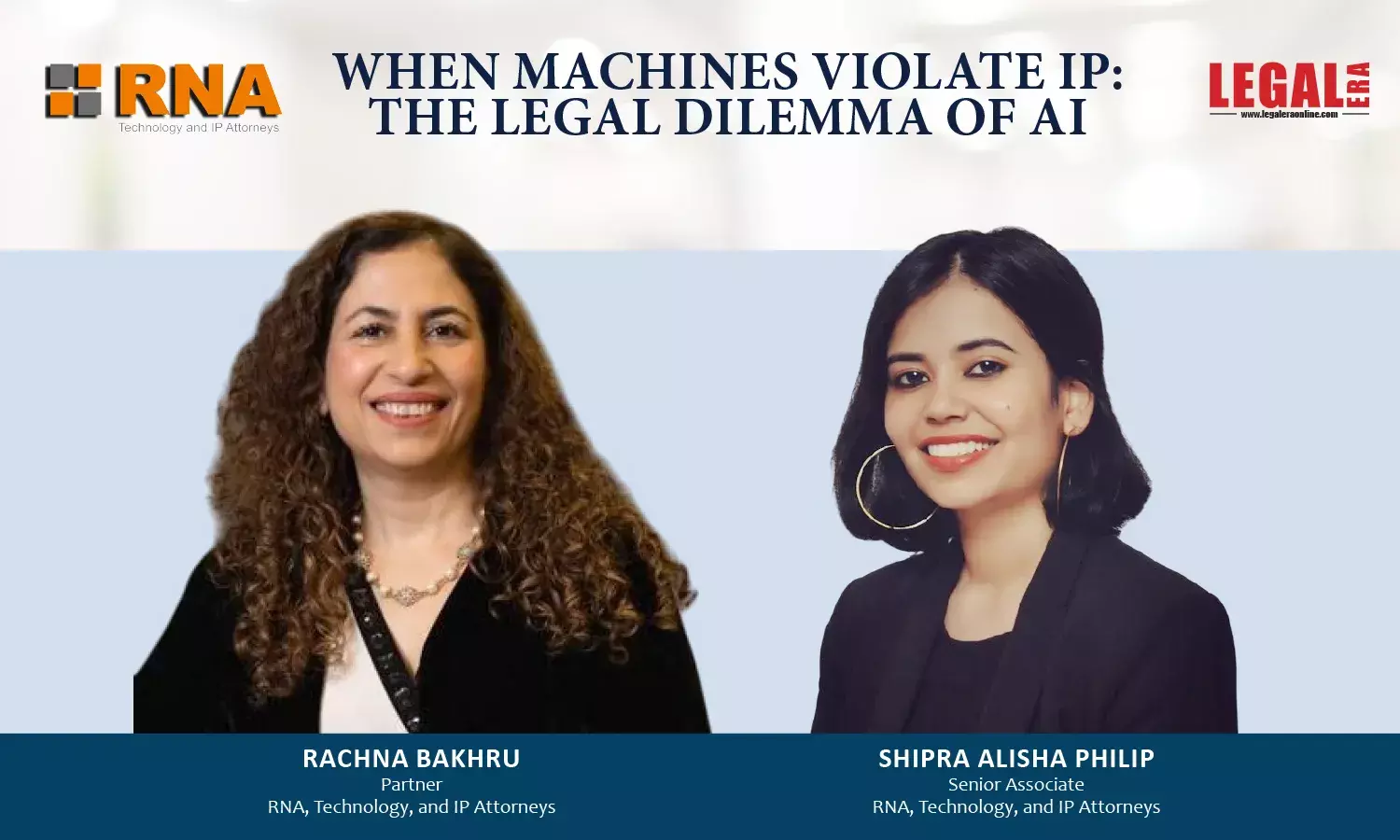When Machines Violate IP: The Legal Dilemma Of AI

When Machines Violate IP: The Legal Dilemma Of AI AI-generated works, trained on extensive datasets, risk infringing existing copyrighted material by mimicking or replicating original works Artificial Intelligence (AI) is transforming industries globally, including in India, with innovative tools and efficiencies. However, its ability to generate art, music, and branded content raises...
When Machines Violate IP: The Legal Dilemma Of AI
AI-generated works, trained on extensive datasets, risk infringing existing copyrighted material by mimicking or replicating original works
Artificial Intelligence (AI) is transforming industries globally, including in India, with innovative tools and efficiencies. However, its ability to generate art, music, and branded content raises complex IP challenges. This article examines how AI impacts India’s copyright, trademarks, and personality rights, highlighting real cases, current laws, and the urgent need for updated legal frameworks.
AI and Copyright Infringement:
AI’s capacity to create art, music, and text raises questions about copyright, as Indian law requires human authorship for protection. AI-generated works, trained on extensive datasets, risk infringing existing copyrighted material by mimicking or replicating original works. For example, AI-generated art resembling a famous artist’s style or music echoing copyrighted melodies blurs the lines between inspiration and infringement.
In a recent example, the Walt Disney Company raised concerns over AI-generated content infringing on its trademarks when users created Pixar-style pet images using Microsoft's Bing AI tool.
Fair Use Vs. Infringement:
India’s copyright law permits “fair use” for research and education, but its applicability to AI training remains debated. While deciding whether fair use provisions are applicable, the courts will consider several factors such as whether the use is for non-commercial, education or research purposes, nature of the copyrighted material used, the extent of such use, the effect of such use on the potential or actual value of the copyrighted work and whether such use transforms the prior work into something new.
The Delhi High Court was faced with similar issues in a recent lawsuit (CS (Comm.) 1028/2024) by ANI Media Pvt. Ltd. against OpenAI, before the Delhi High Court alleging unauthorized use of ANI’s content to train ChatGPT, leading to false attributions. The case explores whether such use constitutes infringement or falls under fair use, with territorial jurisdictional complexities due to OpenAI’s servers based in the U.S. Given the emerging issues and complexity of the legal questions posed by the interplay between Artificial Intelligence and copyright law, the court has appointed two experts as Amicus curiae to analyze the issues and submit their reports by January 28, 2025.
AI and Trademark Infringement:
AI systems have also emerged as both tools and culprits in trademark infringement.
Counterfeiting and Brand Misuse:
While AI aids in detecting counterfeit goods, it also enables the creation of convincing knockoffs. AI enables counterfeiters to replicate trademarks, logos, and packaging with alarming precision, deceiving consumers and damaging brand reputations, particularly in the healthcare, fashion, and technology sectors.
AI-driven tools have produced fake luxury items, such as handbags, shoes, and watches, closely mimicking the original designs and branding. Additionally, low-cost AI tools are now capable of forging authentic documents, which can be exploited for fraudulent remote registration processes.
In a recent example, the Walt Disney Company raised concerns over AI-generated content infringing on its trademarks when users created Pixar-style pet images using Microsoft’s Bing AI tool. The concern was not the artwork but the AI’s potential to accidentally generate the Disney-Pixar logo, constituting trademark infringement. This highlights the risk of AI inadvertently violating trademarks, urging brand owners to stay vigilant.
Domain Name Disputes:
AI has contributed to cybersquatting, where domain names mimicking established brands are registered to mislead consumers or extort money—mechanisms like the.IN Dispute Resolution Policy (INDRP) and Uniform Domain Name Dispute Resolution Policy (UDRP) have been instrumental in addressing such issues.
AI-Driven Marketing Violations:
AI-powered advertising tools can inadvertently misuse keywords or create branded content without proper authorization, leading to misleading or deceptive ads. For instance, an AI-driven campaign promoting a generic product might improperly use a competitor’s trademark, potentially resulting in trademark infringement disputes. Additionally, AI-generated endorsements—such as deepfake ads featuring public figures—appear realistic but are often deceptive, misleading consumers by falsely implying endorsement without consent.
AI and Personality Rights Violations:
AI technologies in India increasingly raise concerns over personality rights violations, enabling hyper-realistic replication of voices, images, and likenesses. The following important cases highlight how AI can misuse or tarnish celebrity personas.
The Delhi High Court in Anil Kapoor vs. Simply Life India & Ors., CS(COMM) 652/2023 upheld Anil Kapoor’s personality rights against unauthorized use of his image and voice cloning, morphed videos, and fake domain names, stressing the risks of such misuse.
Similarly, in Arijit Singh vs. Codible Ventures LLP, COM IPR SUIT (L) 23443/2024, the Bombay High Court addressed AI voice cloning, unauthorized merchandise, and false event associations, ruling that commercial exploitation without consent is impermissible, even considering free speech.
Recently, the Delhi High Court in Dr. Devi Prasad Shetty vs. Medicine Me, CS (Comm.) 1053/2024 protected renowned cardiac surgeon Dr. Shetty’s personality rights from deepfakes, directing platforms like Meta and Google to block infringing content and disclose offenders.
These cases underscore the judiciary’s commitment to safeguarding public figures’ rights against AI-driven abuses while ensuring control over their public identity. These cases reflect Indian courts’ commitment to protecting personality rights against evolving technological abuses, ensuring individuals retain control over their public identity.
Liability and Legal Framework for AI-Driven Infringement:
India’s legal framework currently lacks specific provisions for AI-driven IP violations but holds human actors accountable. This includes AI developers, users, and system owners who may face liability for AI-related infringements. Platforms using AI tools could also be held accountable if they fail to address infringement notifications. Beyond liability, key initiatives have been introduced to guide the responsible development of AI technologies.
The National AI Strategy, launched by NITI Aayog, focuses on critical sectors like healthcare and education. At the same time, the Principles for Responsible AI outline ethical guidelines for AI governance, including safety, privacy, and accountability.
The Digital Personal Data Protection Act 2023 mandates strict data security and privacy measures, ensuring AI systems handle personal data responsibly.
The Information Technology Act 2000 addresses various AI-related violations, including cybercrimes and content regulation, and holds platforms liable for failing to remove harmful AI-generated content.
The National Data Governance Framework Policy (2022) aims to enhance government data management and support AI research by building a comprehensive dataset repository.
Additionally, the Ministry of Electronics and Information Technology and the Bureau of Indian Standards are working on setting standards for AI development, safety, and ethics. Together, these frameworks are shaping India’s approach to regulating AI technologies.
Way Forward
While providing a solid foundation, India’s legal framework has the potential to evolve further to address the dynamic nature of AI-related IP violations and accountability. By establishing clear ownership rules and implementing tailored provisions, India can ensure comprehensive coverage of AI’s impact on intellectual property and digital content. For transparency and accountability, a sui generis law governing AI is the need of the hour.
Disclaimer – The views expressed in this article are the personal views of the authors and are purely informative in nature.




